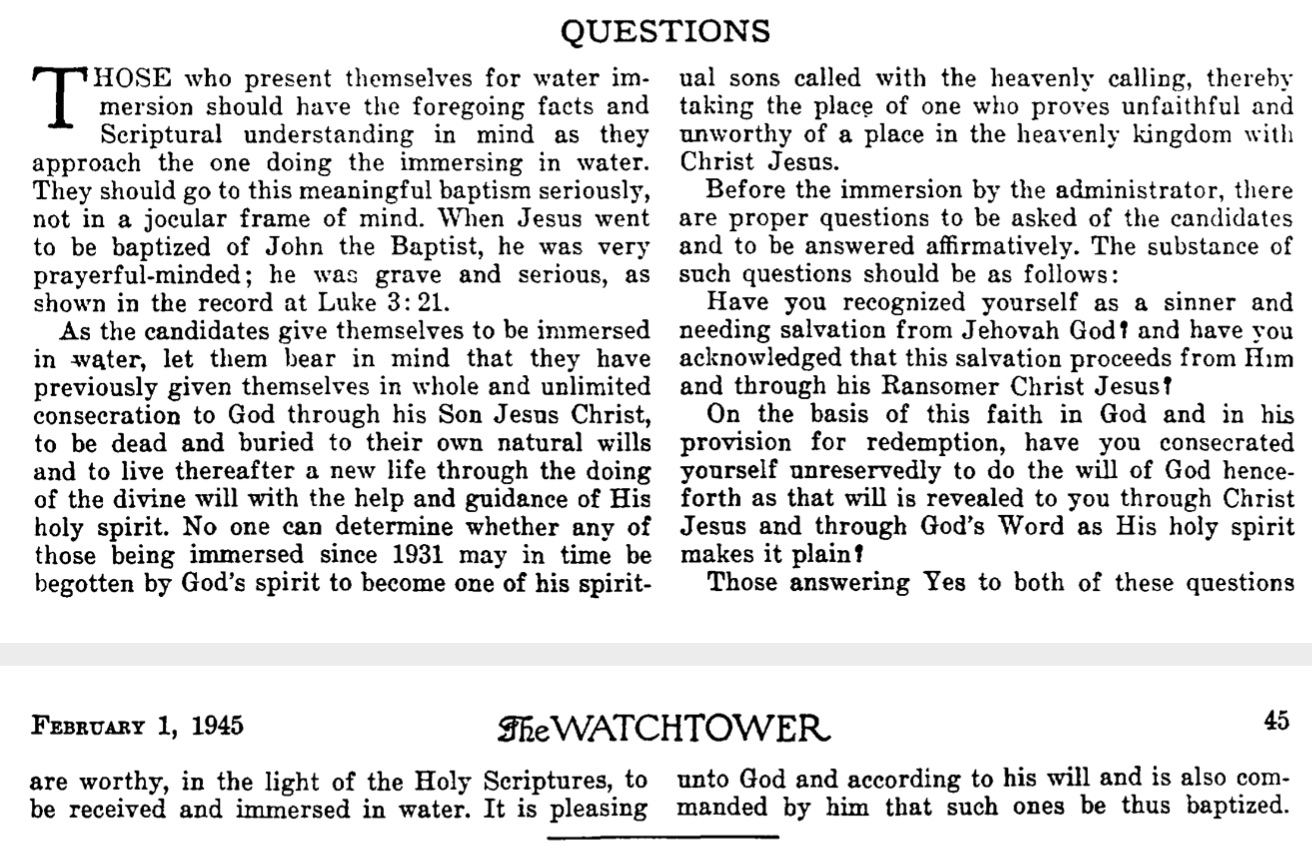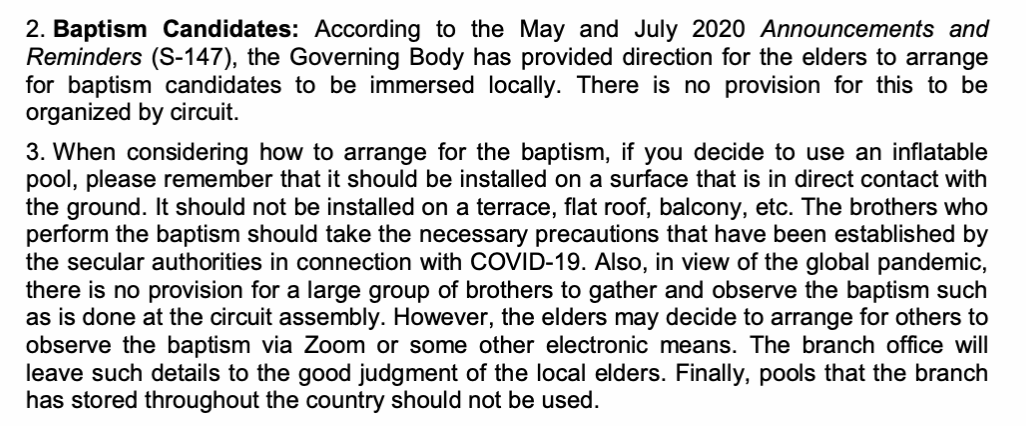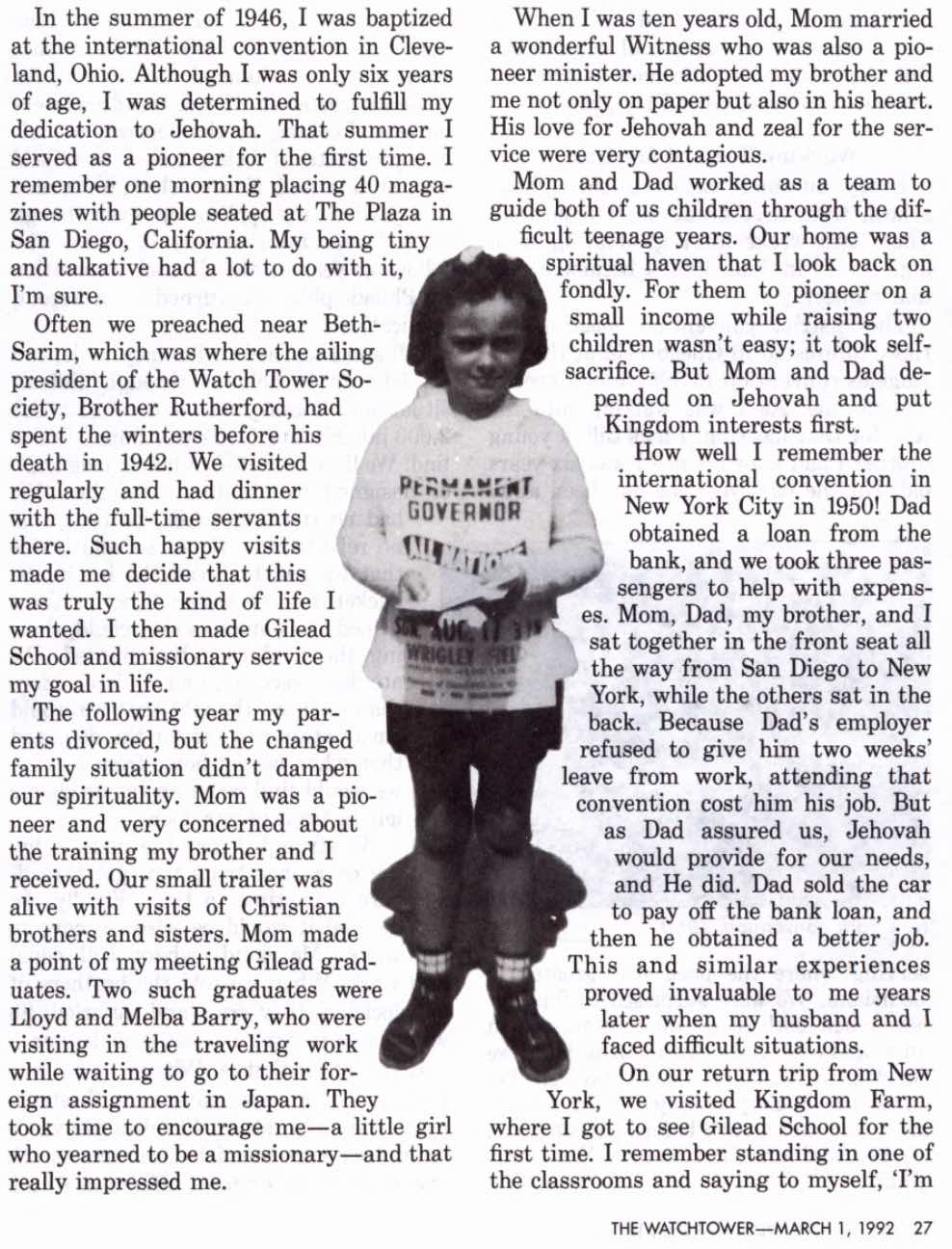home > changed teachings > baptism
Changing Baptism Arrangement
Jesus commanded to baptise in the name of the Father, Son and Holy Spirit. Over time, Watchtower has changed the question asked prior to immersion, replacing "holy spirit" with "spirit-directed organization," and then removing reference to the "holy spirit" altogether. Scriptural precedence is ignored in order to elevate the Watchtower organization.
| Bible | Watchtower |
|---|---|
|
Matthew 28:19 "Go therefore and make disciples of people of all the nations, baptizing them in the name of the Father, and of the Son and of the holy spirit". |
(1) “Have you repented of your sins, dedicated yourself to Jehovah, and accepted his way of salvation through Jesus Christ?”
(2) “Do you understand that your baptism identifies you as one of Jehovah’s Witnesses in association with Jehovah’s organization?” |
At Matthew 28:19, Jesus outlined a simple yet powerful baptismal process. It was to be "in the name of the Father, and of the Son and of the holy spirit". He made no mention of affiliation with any earthly organization. Whilst the Watchtower baptism arrangement originally followed the requirements set by Jesus, it has gradually deviated from his guidelines.
Watchtower originally followed Matthew 28:19, with baptism "in the name of the Father and of the Son and of the holy spirit." In 1985, the baptismal question replaced the holy spirit with the spirit-directed Organization. In 2019, in blatant disregard for Jesus' words, reference to the holy spirit was completely removed.
Baptismal exclusivism is a major symbolical sectarian feature and the changes outlined below represent Watchtowers desire for stricter control and segregation of its members.
Christian baptism requires confession of faith in Jesus, followed by full water immersion. The simplicity of this ritual is attested to by multiple New Testament examples; the Ethiopian Eunuch, those that presented themselves to John the Baptist and the 3000 Peter baptised.
Acts 8:36 "The eunuch said: "Look! A body of water; what prevents me from getting baptized?""
At times followers were baptised in the name of Jesus alone. However, it was then necessary later to specifically pray to receive the holy spirit.
Acts 2:38 "Peter [said] to them: "Repent, and let each one of YOU be baptized in the name of Jesus Christ for forgiveness of YOUR sins, and YOU will receive the free gift of the holy spirit."
Acts 8:14-16 "When the apostles in Jerusalem heard that Sa·mar´i·a had accepted the word of God, they dispatched Peter and John to them; 15 and these went down and prayed for them to get holy spirit. 16 For it had not yet fallen upon any one of them, but they had only been baptized in the name of the Lord Jesus."
Originally that was how baptism was conducted by Jehovah's Witnesses. Over time a regimented pre-baptism approval procedure has developed, with the "baptismal candidate" answering numerous questions about Watchtower doctrine as part of a process of being judged worthy by 3 elders. Most significantly, since 1985 the candidate declares they are devoting themselves to the "organization" when answering the two pre-immersion questions.
As late as 1955, a person did not need to be baptised by a Watchtower representative to be considered one of Jehovah's Witnesses. Baptism by another Christian denomination was considered valid, provided it was as an adult by full immersion. The Watchtower 1955 Jul 1 p.412 paragraph 20 explained that re-baptism was necessary only if the previous baptism was not in symbol of a dedication, or if it was not by immersion.
It was not until 1956 that a Watchtower baptism became mandatory.
"Yes, one must be baptized again. Obviously, by any of such religious systems one was never in reality baptized "in the name of the Father and of the Son and of the holy spirit," because had he been so baptized he would have appreciated the authority and office of such true Higher Powers." Watchtower 1956 Jul 1 p.406
The rationale for the change was that though other religions baptise in the name of "The Father, and the Son, and the holy spirit", they do not recognise Jehovah and Jesus to represent the Higher Powers of Romans 13:1. The irony is that shortly after this, Watchtower also stopped recognising this passage as having reference to Jehovah and Jesus. This view of the Higher Powers was only held between 1928 and 1961.
More unusual, the Watchtower 1956 December 15 p.763 made the qualification that only those who had been baptised after 1918 needed to be re-baptised. Apparently that was the date when Christendom was officially rejected by Jehovah.
The pre-baptismal process continued to become more rigid. To qualify for baptism, it became necessary for an interested person to answer 80 questions in front of 3 different elders.
"All who do get baptized are first given thorough instruction in basic Bible teachings, and thereafter (especially since 1967) elders in the congregation review such teachings with each baptismal candidate." Proclaimers p.186
This was changed to 124 questions in the 1983 Organized to Accomplish Our Ministry and 104 questions in the 2005 Organized To Do Jehovah's Will pp.182-216.
There is no Biblical precedence that requires passing an exam prior to baptism. Watchtower claims Jews needed no such questions, as they already knew Jehovah's requirements and simply had to confess faith in Jesus to be baptised. This is nonsense. In Jesus day there were numerous Jewish Sects with a range of beliefs. Sadducees and Pharisees had diametrically opposing views of the resurrection. Other Jews had little knowledge of their religious teachings and the Mosaic Law. (John 7:49) In addition to this, Jesus revelation of the Sacred Secret did away with the Mosaic Law and its arrangement of animal sacrifices, making Christianity significantly different to Judaism. Despite this theological gulf between Jewish thinking and Christianity, baptism only required that a person such as the Ethiopian Eunuch profess faith in Jesus.
Rather than follow the Biblical example of confession in Christ prior to baptism, to be baptised as one of Jehovah's Witnesses requires proving an intricate knowledge of Watchtower doctrine, and dedication to the Watchtower organization.
Baptism Questions
Under Russell, baptism candidates consecrated themselves to the Lord only, and it was specifically noted that baptism was not to any particular sect.
"What are the questions usually put by Brother Russell when receiving candidates for water immersion?
ANSWER.--You will notice that they are on broad lines--questions which any Christian, whatever his confession, should be able to answer in the affirmative without hesitation if he is suitable to be acknowledged as a member of the Church of Christ:
(1) Have you repented of sin with such restitution as you are able, and are you trusting in the merit of Christ's sacrifice for the forgiveness of your sins and the basis of your justification?
(2) Have you made a full consecration of yourself with all the powers that you possess--talent, money, time, influence--all to the Lord, to be used faithfully in His service, even unto death?
(3) On the basis of these confessions, we acknowledge you as a member of the Household of Faith, and give to you as such the right hand of fellowship, not in the name of any sect or party or creed, but in the name of the Redeemer, our glorified Lord, and His faithful followers." What Pastor Russell Said pp.35-36
Later, two questions developed containing reference to Jehovah, Jesus and the holy spirit.

Watchtower 1945 Feb 1 p.44
Watchtower continued to clarify that baptism is not in the name of any organisation.
"A Christian, therefore, cannot be baptized in the name of the one actually doing the immersing or in the name of any man, nor in the name of any organization, but in the name of the Father, the Son and the holy spirit." Watchtower 1955 Jul 1 p.411
Emphasis of baptism shifted from Jesus to Jehovah.
"We do not dedicate ourselves to a religion, nor to a man, nor to an organization. No, we dedicate ourselves to the Supreme Sovereign of the Universe, our Creator, Jehovah God himself. This makes dedication a very personal relationship between us and Jehovah." Watchtower 1966 Oct 1 pp.603-604
In 1985, a significant change was introduced. In total disregard to Biblical guidance, and Watchtower's previous comments, it became a requirement for the baptismal candidate to announce their desire to become associated with an Organization.
"At the close of the convention baptism talk, the baptism candidates will be in position to answer with depth of understanding and heartfelt appreciation two simple questions that serve to confirm that they recognize the implications of following Christ's example.
The first question is:
On the basis of the sacrifice of Jesus Christ, have you repented of your sins and dedicated yourself to Jehovah to do his will?
The second is:
Do you understand that your dedication and baptism identify you as one of Jehovah's Witnesses in association with God's spirit-directed organization? Having answered yes to these questions, candidates are in a right heart condition to undergo Christian baptism." Watchtower 1985 Jun 1 p.30
In 2019, reference to the holy spirit was removed altogether.
“(1) “Have you repented of your sins, dedicated yourself to Jehovah, and accepted his way of salvation through Jesus Christ?”
(2) “Do you understand that your baptism identifies you as one of Jehovah’s Witnesses in association with Jehovah’s organization?””

ANNOUNCEMENTS AND REMINDERS May 2019
Whilst the baptism questions no longer include the holy spirit, this is not the impression given to the public. The "Bible Questions Answered" section of jw.org has an article What is Baptism? and answers the question by saying; "'In the name of' means that the one being baptized recognizes the authority and position of the Father and the Son, as well as the role of God’s holy spirit." There is no mention that the baptizm questions omit holy spirit and include the organization.
Age of Baptism
Watchtower criticises Christendom for infant baptism.
"Many mainstream churches of Christendom still baptize newborn babies. Moreover, throughout history, compulsory baptism of conquered “pagans” was practiced by rulers and religious leaders of so-called Christian nations. But infant baptism and forced baptisms of adults have no foundation in the Bible." Watchtower 2006 Jul 1 p.26
"Does the Bible teach infant baptism?
No, it does not. Christian baptism is for those old enough to understand and believe in “the good news of the Kingdom of God.” (Acts 8:12) It is linked with hearing God’s word, accepting it, and repenting—actions that an infant cannot take.—Acts 2:22, 38, 41." Bible Questions Answered - What is Baptism? (As of 28 May 2017)
"The apostle Paul warned, however, that eventually there would come a time "when people will not tolerate sound doctrine." (2 Timothy 4:3, The New American Bible) After the apostles died and were no longer able to 'act as a restraint,' unscriptural practices began to creep into Christian worship. (2 Thessalonians 2:6) Among them was infant baptism." Watchtower 1986 Mar 15 p.5
"Therefore, claims that baptism is necessary to save infants are entirely unfounded. … Jesus instructed his followers to "go . . . and make disciples [or, taught ones] of people of all the nations, baptizing them." (Matthew 28:19) It is therefore those old enough to be disciples, or taught ones, who should be baptized. Thus, true Christians today endeavor to train —not baptize— their children from infancy." Awake! 1986 Oct 8 p.27
"Christian baptism required an understanding of God’s Word and an intelligent decision to present oneself to do the revealed will of God Insight on the Scriptures ... baptism requires the individual to make a solemn decision, it is apparent that one must at least be of age to hear, to believe, and to make this decision." Insight on the Scriptures, Volume 1 pp.250-251
The Scriptures give no age requirements for baptism. Still, infants certainly could not become believers, exercise faith, or make a dedication to God. (Acts 8:12) Regarding first-century Christians, historian Augustus Neander states in his book General History of the Christian Religion and Church: “Baptism was administered at first only to adults, as men were accustomed to conceive baptism and faith as strictly connected.” In the case of youths, some develop a measure of spirituality at a relatively tender age, while others take longer. Before getting baptized, however, a youngster should have a personal relationship with Jehovah, a sound understanding of the fundamentals of the Scriptures, and a clear comprehension of what dedication involves, as is the case with adults.” The Watchtower—Study Edition 2006 Apr 1
Despite such criticism, and recognising that baptism requires informed consent, Watchtower highlights it allows the baptism of children as young as 6.
"In the summer of 1946, I was baptized at the international convention in Cleveland, Ohio. Although I was only six years of age, I was determined to fulfill my dedication to Jehovah." Watchtower 1992 Mar 1 p.27
"BAPTIZED AT SEVEN. Paola, who lives in western Mexico, is being raised by her grandparents. Her grandmother began studying the Bible with Jehovah’s Witnesses when Paola was five years old. Paola listened in, and the truth took root in her young heart. Although her grandmother did not progress, Paola began to attend the meetings by herself. She would ask her grandparents to help her get dressed and to help her cross the street to get to the Kingdom Hall.
As soon as she learned to read and write, Paola enrolled in the Theocratic Ministry School and became a publisher. Because of her love for Jehovah, she got baptized at the age of seven. " Yearbook 2011 p.58
Jehovah's Witnesses are generally baptised between 10 and 18.
 Image Source - Watchtower Study Ed Mar 2016
Image Source - Watchtower Study Ed Mar 2016
During Covid-19 restrictions, baptisms continued to be encouraged, though on an individual basis to comply with health guidelines. Rather than wait a year or two, minors continued to be encouraged to be baptised. My neice and second cousin were both baptised in 2020 at the age of 15, swept up in the Covid-19 excitement that it was proof Armageddon was imminent. Announcements and Reminders Sep 2020 (S-147-20.09-E) advised that "Of course, minors getting baptized would be accompanied by at least one parent."
Why the urgency? Jesus set the example of being 30 years old when baptised. Does a 15-year-old comprehend what they are devoting themselves to? The brain does not reach maturity until 25, which is why at 16 a person is legally too young to get married, smoke, drink alcohol, drive a car, join the army or even vote. Yet by that age, Watchtower expects dedication to an organisation that can disfellowship the person and force shunning if they ever change their mind, regardless of whether they are 17 or 70.
Watchtower's cartoon series for children shows a discussion with Sophia regarding baptism at The Steps to Baptism 2023-06-05. Here it discusses how young Sophia's mother was when she got baptised.

Watchtower spuriously presents child baptised as a protection.
“A Christian mother writes: “Children who are baptized have more reasons to stay away from the bad things of the world. My son, baptized at 15, feels that baptism is a protection. ‘You don’t think about doing something contrary to Jehovah’s law,’ he said. Baptism is a strong motivation for righteousness.”” Watchtower Study Ed. June 2011 p.6
Baptism does not stop a person having temptations or doubts when they are older. They may think twice before doing wrong, contemplating the consequences of being disfellowshipped and shunned, in which case such protection equates to bribery. Even so, two-thirds of those raised as Jehovah's Witnesses eventually leave the religion, with baptism the opposite of a protection, as it sets the child up later for the devastating consequences of being shunned.

Watchtower Baptismal Requirements
Prior to 1951
Baptism as a Christian in any religion, provided by full water immersion. (What Pastor Russell Said pp.35,36)
1955 to 1985
Baptised by Watchtower Representative.
To Father, Son and Holy Spirit.
1985 to 2019
Baptised by Watchtower Representative.
To Father, Son and the spirit-directed Organization w85 6/1 p.30
2019 onwards
Baptised by Watchtower Representative.
To Father and Son and Jehovah's Organisation. No mention of holy spirit. ANNOUNCEMENTS AND REMINDERS May 2019
Changing Baptismal Questions
On the day of baptism, the candidate is required to answer two questions publicly. The following traces these changes.
Baptismal questions from the Watchtower 1944 Feb 1 p.44:
Have you recognized yourself as a sinner and needing salvation from Jehovah God? and have you acknowledged that this salvation proceeds from Him and through his Ransomer Christ Jesus?
On the basis of this faith in God and in his provision for redemption, have you consecrated yourself unreservedly to do the will of God henceforth as that will is revealed to you through Christ Jesus and through God's Word as His holy spirit makes it plain?"
Baptismal questions from the Watchtower 1956 Jul 1 p.407:
(1) Have you recognized yourself before Jehovah God as a sinner who needs salvation, and have you acknowledged to him that this salvation proceeds from him the Father through his Son Jesus Christ?
(2) On the basis of this faith in God and in his provision for salvation, have you dedicated yourself unreservedly to God to do his will henceforth as he reveals it to you through Jesus Christ and through the Bible under the enlightenment of the holy spirit?"
Baptismal questions from the Watchtower 1966 Aug 1 p.465:
(1) Have you recognized yourself before Jehovah God as a sinner who needs salvation, and have you acknowledged to him that this salvation proceeds from him, the Father, through his Son Jesus Christ?
(2) On the basis of this faith in God and in his provision for salvation, have you dedicated yourself unreservedly to God to do his will henceforth as he reveals it to you through Jesus Christ and through the Bible under the enlightening power of the holy spirit?
Baptismal questions from the Watchtower 1970 May 15 p.309:
(1) Have you recognized yourself as a sinner and needing salvation from Jehovah God? And have you acknowledged that this salvation proceeds from him and through his ransomer, Christ Jesus?
(2) On the basis of this faith in God and in his provision for redemption have you dedicated yourself unreservedly to Jehovah God, to do his will henceforth as that will is revealed to you through Christ Jesus and through God's Word as his holy spirit makes it plain?
Baptismal questions from the Watchtower 1973 May 1 p.280:
(1) Have you repented of your sins and turned around, recognizing yourself before Jehovah God as a condemned sinner who needs salvation, and have you acknowledged to him that this salvation proceeds from him, the Father, through his Son Jesus Christ?
(2) On the basis of this faith in God and in his provision for salvation, have you dedicated yourself unreservedly to God to do his will henceforth as he reveals it to you through Jesus Christ and through the Bible under the enlightening power of the holy spirit?
Baptismal questions from the Watchtower 1985 Jun 1 p.30:
(1) On the basis of the sacrifice of Jesus Christ, have you repented of your sins and dedicated yourself to Jehovah to do his will?
(2) Do you understand that your dedication and baptism identify you as one of Jehovah's Witnesses in association with God's spirit-directed organization?
Baptismal questions from ANNOUNCEMENTS AND REMINDERS May 2019 (section FOR THE ELDERS ONLY).
3. Baptism Questions: The two baptism questions that are reviewed with candidates at the time of their concluding discussion with the elders and that are included at the end of each baptism talk outline have been changed as follows: (1) “Have you repented of your sins, dedicated yourself to Jehovah, and accepted his way of salvation through Jesus Christ?” (2) “Do you understand that your baptism identifies you as one of Jehovah’s Witnesses in association with Jehovah’s organization?” The new questions will be used starting with the baptism talks at assemblies and conventions beginning the week of May 13, 2019. Elders should update the two questions on page 209 in their copies of Organized to Do Jehovah’s Will.
Full Immersion
Jehovah's Witnesses baptise with full immersion and not sprinkling.
"The Greek baʹpti·sma refers to the process of immersion, including submersion and emergence; it is derived from the verb baʹpto, meaning “dip.” (Joh 13:26) In the Bible, “to baptize” is the same as “to immerse.”… it is clear that baptism is complete immersion or submersion in water, not a mere pouring or sprinkling.” Insight on the Scriptures, Volume 1 pp.248,252
“Complete immersion appropriately symbolizes the dramatic change we have made in our life —we figuratively die to our former life course and begin life anew in the service of God.” The Watchtower—Study Edition 2006 Apr 1
In my case, I was baptised on a cold Tasmanian day in a corrugated iron tub that looked like someone had stolen a local farm sheep dip.

Other peculiarities can relate to local insurance requirements or government regulations, such as a July 2020 announcement in Spain regarding baptism during the Covid-19 pandemic, advising the baptismal pool be "in direct contact with the ground."

The quality of the water enclosure seems of little matter, with an "inflatable pool" being sufficient.
The Qualification Questions
In order to gain approval for baptism, a series of questions require answering before the elders to prove an adequate understanding of Watchtower teachings. Each reincarnation of the Organized book slightly changed the number and content of these questions. These were 80 in 1967, rising to over 120, and back down to 60 in 2019.
"When an unbaptized publisher makes known his desire to get baptized, he should be encouraged to review carefully the “Questions for Those Desiring to Get Baptized,” found on pages 185-207 of this book. ... If the person has made a dedication, then the coordinator of the body of elders will make arrangements for two of the elders to discuss with the person the “Questions for Those Desiring to Get Baptized.” A different elder should be assigned to handle each of the two parts." Organized to Do Jehovah’s Will (2019) p.208
The 2019 questions are as follows.
Part 1: Christian Beliefs
1. Why do you want to get baptized?
2. Who is Jehovah?
3. Why is it important for you to use God’s personal name?
4. What are some terms used in the Bible to describe Jehovah?
5. What can you give Jehovah God?
6. Why do you want to be loyal to Jehovah?
7. To whom do you pray, and in whose name do you pray?
8. What are some of the things you can pray about?
9. Why might Jehovah not listen to a person’s prayer?
10. Who is Jesus Christ?
11. Why did Jesus come to earth?
12. How can you show your thankfulness for Jesus’ sacrifice?
13. What authority does Jesus have?
14. Do you believe that the Governing Body of Jehovah’s Witnesses is “the faithful and discreet slave” appointed by Jesus?
15. Is the holy spirit a person?
16. How has Jehovah used his holy spirit?
17. What is the Kingdom of God?
18. How will God’s Kingdom benefit you?
19. How do you know that Kingdom blessings will soon be here?
20. How do you show that the Kingdom is important to you?
21. Who are Satan and the demons?
22. Of what has Satan accused Jehovah and those who worship Him?
23. How can you prove that Satan’s accusations are false?
24. Why do people die?
25. What is the condition of the dead?
26. What hope is there for those who have died?
27. How many people go to heaven to rule with Jesus?
Part 2: Christian Living
1. What is the Christian standard for marriage? What is the only basis for a Scriptural divorce?
2. Why should those living together as husband and wife be legally married? If you are married, are you sure that your marriage is legal and recognized by the government?
3. What is your role in the family?
4. Why should we show respect for life?
5. Why should we not kill anyone, including an unborn baby?
6. What is God’s command regarding blood?
7. Why must we love our Christian brothers and sisters?
8. To avoid transmitting an infectious, potentially fatal disease to others:
(a) Why should an infected person not initiate displays of affection, such as hugging and kissing?
(b) Why should he not react negatively if some choose not to invite him into their home?
(c) Why should a person who may have been exposed to an infectious disease voluntarily choose to have a blood test before beginning a courtship?
(d) Why should a person with an infectious disease inform the coordinator of the body of elders before getting baptized?
9. Why does Jehovah expect us to forgive others?
10. What should you do if a brother slanders or defrauds you?
11. How does Jehovah view the following sins?
▪ Sexual immorality
▪ Use of images in worship
▪ Homosexuality
▪ Stealing
▪ Gambling
▪ Drunkenness
12. Regarding sexual immorality, which includes a variety of sexual acts outside of marriage, what are you determined to do?
13. Why should we abstain from the nonmedical use of addictive or mind-altering substances?
14. What are some of the demonic practices that God forbids?
15. If a person commits a serious sin and wants to be restored to Jehovah’s favor, what should he immediately do?
16. If you know that a fellow Christian has committed a serious sin, what should you do?
17. If an announcement is made that someone is no longer one of Jehovah’s Witnesses, how should we treat him?
18. Why should your close friends be those who love Jehovah?
19. Why are Jehovah’s Witnesses politically neutral?
20. Why should you obey the government?
21. If there is a conflict between a human law and God’s law, what would you do?
22. What scriptures can help you to remain separate from the world when choosing a job?
23. What kind of entertainment and recreation will you choose, and what kind will you reject?
24. Why do Jehovah’s Witnesses not worship with other religious groups?
25. What principles will help you decide whether to participate in a celebration?
26. How do Bible examples help you decide whether to celebrate birthdays?
27. Why do you want to follow the guidance of the elders?
28. Why is it important for you and your family to set aside time regularly to read and study the Bible?
29. Why do you love attending and participating in the meetings?
30. What is the most important work that Jesus has given us to do?
31. When we make donations to the Kingdom work or help our brothers and sisters, what attitude pleases Jehovah?
32. What difficulties do Christians expect to experience?
33. Why is it a special privilege to be baptized as one of Jehovah’s Witnesses?
The 80 questions from the 1967 Organized book were similar in substance.
1. Who is the true God?
2. What kind of God is Jehovah?
3. What does it mean to know God?
4. What does the Bible mean when it says that Jehovah requires our exclusive devotion?
5. How will Jehovah God sanctify his name? How can we have a share in it?
6. Who is Jesus Christ, and what is his position in relation to Jehovah God?
7. Why did Jesus die a sacrificial death?
8. How is the ransom an expression of God’s love for mankind?
9. How does the ransom affect us as individuals?
10. What is the holy spirit?
11. How can we benefit from the operation of that spirit today?
12. Whose ideas are recorded in the Bible? Does that mean that God personally spoke or wrote it all? Is all of it true?
13. Why should we pray, to whom, and how often?
14. About what is it proper to pray?
15. What is the kingdom of God?
16. What does it mean to “seek first the kingdom”?
17. When Christ returns, is it visibly as a man, or how?
18. How can people know when his second presence occurs?
19. What is God’s purpose for the earth?
20. How will this purpose be realized?
21. What conditions will prevail on earth in God’s new system of things?
22. Who is the Devil? What is his origin?
23. Against what spiritistic practices employed by the Devil and his demons does the Bible warn us?
24. How can we protect ourselves against the influence of these wicked spirits?
25. Why has God permitted wickedness to continue until now?
26. By what means will God destroy the wicked?
27. What is the human soul? Can it die?
28. What is sin, and how did we all become sinners?
29. What should be our attitude toward committing sins?
30. Do only those who have committed a gross sins or flagrant violations of God’s Word need to repent?
31. What is death?
32. Why do people die?
33. What future hope for life is there for one who dies?
34. How many from among mankind will be in heaven with Christ?
35. What will they do there?
36. Are Christians under the law covenant with its requirements of Sabbath keeping and sacrifice?
37. What Christian quality should outstandingly characterize our relationship with our spiritual brothers and with the members of our own families?
38. In God’s arrangement, who is head of a married woman?
39. How should a husband exercise his headship?
40. Is the wife whose husband is not a believer freed from his headship?
41. Who is responsible before God for the training and disciplining of children?
42. May a Christian have more than one living marriage mate?
43. What is the only Scriptural basis for divorce that frees one to remarry?
44. Must persons living together as husband and wife have their marriage legally registered with the government?
45. Why must lying be avoided?
46. What is the Christian view of stealing?
47. What is the Christian view of drunkenness?
48. What is God’s law concerning blood?
49. What does the Bible say about fornication, adultery, sexual relations with another person of the same sex and other loose conduct? May a person who is engaging in such practices be baptized?
50. Why is moral cleanness of all persons among Jehovah’s people important to every one of us?
51. When difficulties arise between individuals because of serious wrongs, what is the Christian way to handle the situation?
52. What action does the congregation take when a person in its midst proves to be a persistent and unrepentant violator of God’s commandments?
53. If a person in weakness commits a serious sin, but he wants to help to be restored to Jehovah’s favor, what action should he take?
54. What is the proper viewpoint to have when one is Scripturally reproved?
55. What is the fruitage of the spirit, and is it reasonable to expect a Christian to manifest this fruitage in his life?
56. How should Christians view the shortcomings of fellow believers?
57. What does the Bible say about sharing with other religius groups in worship or any of the other activities in which they engage?
58. What is the only religious celebration that Christians are commanded to observe?
59. What Bible principles should guide us in determining whether other celebrations that are popular in the community are acceptable for Christians?
60. Whom does the Bible identify as the “ruler of the world” and “the god of this system of things”?
61. What is the position of Christians as to this world alienated from God?
62. What was Jesus’ attitude toward all participation in the political affairs of the world?
63. How do Bible commands concerning idolatry affect a Christian in this modern world?
64. In the light of the following texts, what is the position of a true Christians in this world?
65. Is it necessary for a Christian to be subject to worldly rulers and to show them respect?
66. Must a Christian pay all the taxes demanded by the law?
67. Is there any circumstance under which a Christian would not obey the law?
68. Why are true Christians persecuted?
69. What are some factors to consider in determining whether certain types of employment are not proper for Christians?
70. What should always be our attitude toward the doing of Jehovah’s will?
71. Why are Christians called Jehovah’s witnesses?
72. Who or what is the “faithful and discreet slave?”
73. What is the governing body of the Christian congregation, and what purpose does it serve?
74. What attitude should Christians show toward those who serve as shepherds in the congregation?
75. Why is it beneficial to attending the meetings arranged by the congregation?
76. Why is personal study important in the life of a Christian?
77. What urgent work does the Bible set out for all Christians at this time?
78. In what various ways may this work be accomplished?
79. Is this work done in our own strength?
80. Why should one who has sincerely repented and turned around and chosen to be a disciple of Christ be baptized?
Written 2008, latest update June 2023.
![]() Paul Grundy 2005 - 2024
Paul Grundy 2005 - 2024

